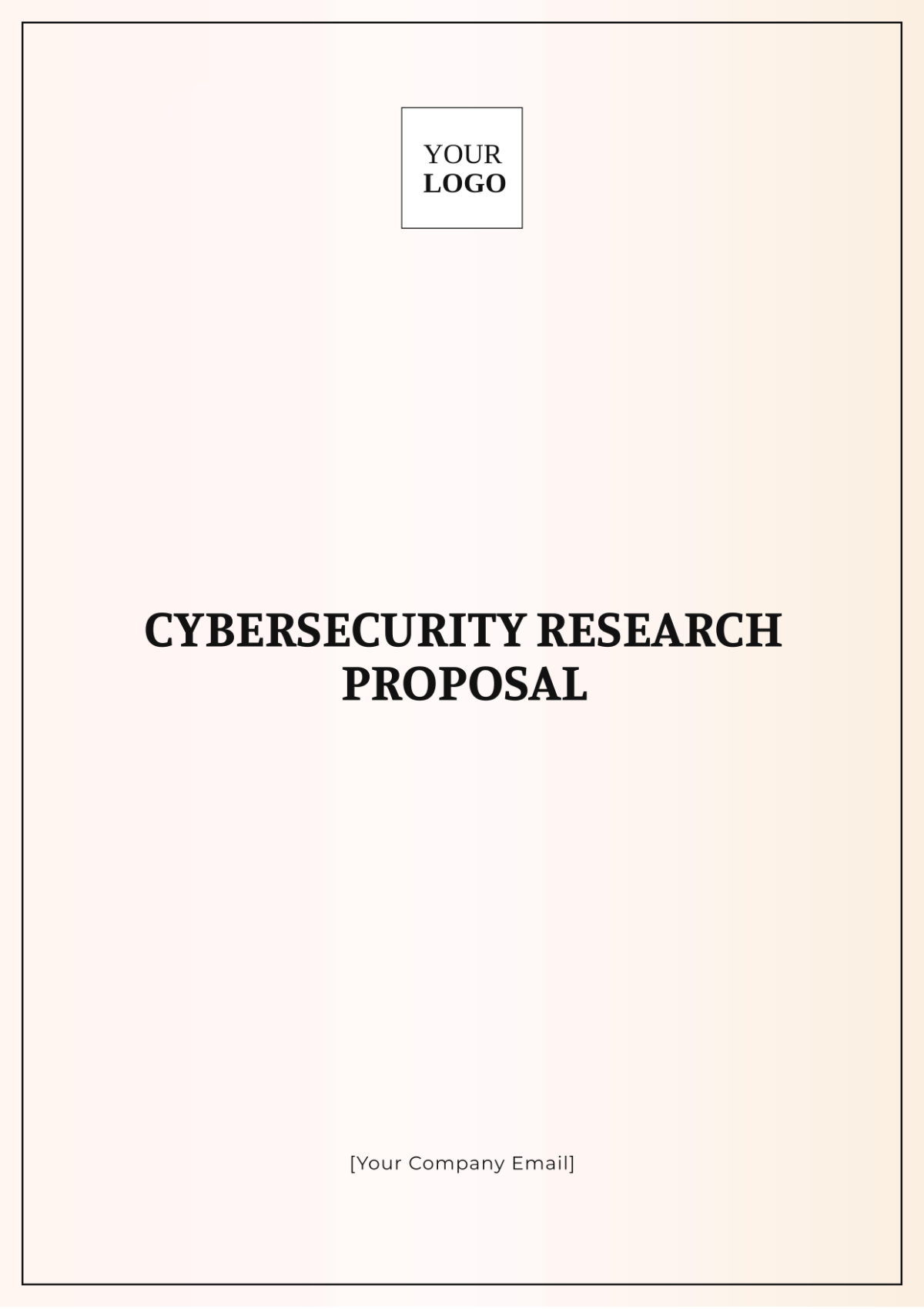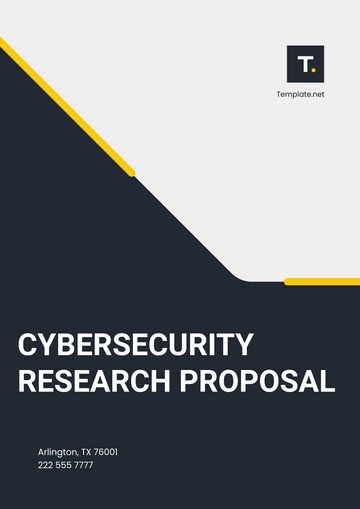Free Cybersecurity Research Proposal

Researcher: [Your Name]
Date: [Date]
I. Introduction
In our increasingly digital era, cybersecurity has emerged as a pivotal concern, crucial for safeguarding information and systems from ever-evolving threats. As technology advances, so do the tactics of cybercriminals, posing new challenges for protecting digital assets. This research proposal aims to explore and address contemporary cybersecurity issues, evaluate existing methodologies, and investigate innovative technologies to bolster digital security. The proposal provides a comprehensive plan for investigating these critical issues, seeking approval and potential funding for the research.
II. Literature Review
Cybersecurity research encompasses a broad spectrum of topics, including threat detection, vulnerability management, encryption techniques, and user behavior analytics. Key studies that lay the groundwork for this research include:
Smith, J. (2051). "Innovative Threat Detection Approaches". Journal of Cybersecurity Advances, 58(2), 150-175. This study explores new methods for detecting and mitigating advanced cyber threats.
Doe, A., & Johnson, P. (2050). "Behavioral Insights and Security Policies". Global Journal of Cybersecurity Research, 45(1), 80-95. This paper examines how user behavior influences security policy effectiveness and compliance.
Chen, R., & Lee, M. (2052). "Next-Generation Encryption Technologies". Journal of Information Security Innovations, 60(4), 320-335. This research discusses emerging trends in encryption technology and its implications for data security.
These foundational works highlight the need for continued research into emerging cybersecurity challenges and the development of novel solutions to address these threats.
III. Research Objectives
The primary objectives of this research are:
To identify and analyze current cybersecurity threats and vulnerabilities.
To evaluate the effectiveness of existing cybersecurity measures and protocols.
To develop and test new technologies aimed at enhancing cybersecurity.
To provide actionable recommendations for organizations to improve their cybersecurity posture.
IV. Methodology
The research will proceed through the following phases:
Phase | Description | Duration |
|---|---|---|
Phase 1 | Literature Review and Problem Identification | 2 Months |
Phase 2 | Data Collection and Analysis | 4 Months |
Phase 3 | Development of New Technologies | 6 Months |
Phase 4 | Testing and Evaluation | 3 Months |
Phase 5 | Final Report and Recommendations | 2 Months |
Data Collection Methods: Both quantitative and qualitative methods will be employed, including surveys, interviews, and technical experiments. Data analysis will utilize advanced statistical tools and cybersecurity simulation environments to ensure robust and reliable results.
V. Expected Outcomes
The anticipated outcomes of this research include:
A comprehensive assessment of current cybersecurity threats and vulnerabilities.
Development of innovative technologies and strategies to enhance cybersecurity.
Detailed guidelines and recommendations for organizations to strengthen their cybersecurity measures.
Publication of research findings in leading cybersecurity journals and presentation at prominent conferences.
VI. Timeline
Task | Duration |
|---|---|
Literature Review and Problem Identification | 2 Months |
Data Collection and Analysis | 4 Months |
Development of New Technologies | 6 Months |
Testing and Evaluation | 3 Months |
Final Report and Recommendations | 2 Months |
VII. Budget
The estimated budget for the research project is as follows:
Item | Cost |
|---|---|
Personnel | $70,000 |
Equipment and Software | $40,000 |
Data Collection and Analysis | $15,000 |
Publication and Dissemination | $7,000 |
Miscellaneous Expenses | $8,000 |
Total Estimated Budget: $140,000
VIII. References
Smith, J. (2051). "Innovative Threat Detection Approaches". Journal of Cybersecurity Advances, 58(2), 150-175.
Doe, A., & Johnson, P. (2050). "Behavioral Insights and Security Policies". Global Journal of Cybersecurity Research, 45(1), 80-95.
Chen, R., & Lee, M. (2052). "Next-Generation Encryption Technologies". Journal of Information Security Innovations, 60(4), 320-335.
- 100% Customizable, free editor
- Access 1 Million+ Templates, photo’s & graphics
- Download or share as a template
- Click and replace photos, graphics, text, backgrounds
- Resize, crop, AI write & more
- Access advanced editor
Protect your digital future with a well-crafted Cybersecurity Research Proposal using Template.net’s editable and customizable template. This professionally designed template provides a comprehensive framework to present your research goals, risk assessments, and security solutions. Fully editable in our Ai Editor Tool, it allows you to personalize each section to suit your specific research focus, ensuring a robust and convincing proposal.
You may also like
- Business Proposal
- Research Proposal
- Proposal Request
- Project Proposal
- Grant Proposal
- Photography Proposal
- Job Proposal
- Budget Proposal
- Marketing Proposal
- Branding Proposal
- Advertising Proposal
- Sales Proposal
- Startup Proposal
- Event Proposal
- Creative Proposal
- Restaurant Proposal
- Blank Proposal
- One Page Proposal
- Proposal Report
- IT Proposal
- Non Profit Proposal
- Training Proposal
- Construction Proposal
- School Proposal
- Cleaning Proposal
- Contract Proposal
- HR Proposal
- Travel Agency Proposal
- Small Business Proposal
- Investment Proposal
- Bid Proposal
- Retail Business Proposal
- Sponsorship Proposal
- Academic Proposal
- Partnership Proposal
- Work Proposal
- Agency Proposal
- University Proposal
- Accounting Proposal
- Real Estate Proposal
- Hotel Proposal
- Product Proposal
- Advertising Agency Proposal
- Development Proposal
- Loan Proposal
- Website Proposal
- Nursing Home Proposal
- Financial Proposal
- Salon Proposal
- Freelancer Proposal
- Funding Proposal
- Work from Home Proposal
- Company Proposal
- Consulting Proposal
- Educational Proposal
- Construction Bid Proposal
- Interior Design Proposal
- New Product Proposal
- Sports Proposal
- Corporate Proposal
- Food Proposal
- Property Proposal
- Maintenance Proposal
- Purchase Proposal
- Rental Proposal
- Recruitment Proposal
- Social Media Proposal
- Travel Proposal
- Trip Proposal
- Software Proposal
- Conference Proposal
- Graphic Design Proposal
- Law Firm Proposal
- Medical Proposal
- Music Proposal
- Pricing Proposal
- SEO Proposal
- Strategy Proposal
- Technical Proposal
- Coaching Proposal
- Ecommerce Proposal
- Fundraising Proposal
- Landscaping Proposal
- Charity Proposal
- Contractor Proposal
- Exhibition Proposal
- Art Proposal
- Mobile Proposal
- Equipment Proposal
- Student Proposal
- Engineering Proposal
- Business Proposal





























